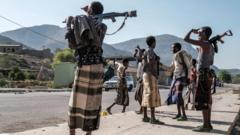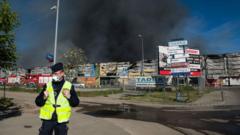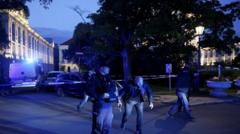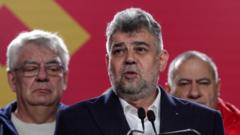As Poland prepares to cast its votes in the presidential election, the spotlight is on two primary candidates: Rafal Trzaskowski, the liberal mayor of Warsaw, and Karol Nawrocki, a historian supported by the national-conservative Law and Justice party. The election outcomes indicate a potential run-off on June 1, shedding light on a population increasingly disillusioned by the longstanding political duopoly of Tusk and Kaczynski.
**Polish Presidential Election: A Historic Opportunity for Change Awaits**
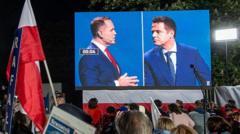
**Polish Presidential Election: A Historic Opportunity for Change Awaits**
Polish citizens brace for a pivotal election as liberal mayor Rafal Trzaskowski and historian Karol Nawrocki vie for the presidency after a decade of Andrzej Duda's leadership.
In an election that could redefine the political landscape of Poland, voters seem poised to usher in significant change and challenge the entrenched divisions within the country’s leadership. With the backdrop of recent power transitions and debates over significant issues, the election highlights citizens' yearning for a future not dominated by the same political players.
Trzaskowski leads the pack as deputy head of the Civic Platform (PO) and aims to continue liberal reforms while Nawrocki seeks to reclaim conservative values under the PiS. With concerns rising over the media's integrity and public rights, observers note the electoral significance of this contest as the expansive capabilities of the presidential office are at stake, especially with outgoing President Andrzej Duda unable to seek re-election after two terms.
The liberal agenda under Tusk faces scrutiny, particularly regarding unfulfilled promises surrounding women's rights and migration reforms, sparking discussions on the political identity of Poland. Many perceive this election as a choice between varying shades of populism, reflecting broader frustrations with traditional party politics.
Central themes include the prospective candidates' positions on LGBTQ+ rights, immigration, and security strategies, with Trzaskowski branded as a champion of equality versus Nawrocki's conservative approach. The latest polls suggest a run-off is likely, marking a notable shift in Polish political dynamics and energizing voters who wish to navigate beyond the confines of established party narratives.
Voters express a mix of dissent and hope, echoing sentiments of fatigue towards the long-standing dominance of the PO and PiS factions. As they prepare to exercise their democratic rights, many Polish citizens are eager for a constructive dialogue that may finally break the cycle of polarization and offer a fresh start for the nation.
Trzaskowski leads the pack as deputy head of the Civic Platform (PO) and aims to continue liberal reforms while Nawrocki seeks to reclaim conservative values under the PiS. With concerns rising over the media's integrity and public rights, observers note the electoral significance of this contest as the expansive capabilities of the presidential office are at stake, especially with outgoing President Andrzej Duda unable to seek re-election after two terms.
The liberal agenda under Tusk faces scrutiny, particularly regarding unfulfilled promises surrounding women's rights and migration reforms, sparking discussions on the political identity of Poland. Many perceive this election as a choice between varying shades of populism, reflecting broader frustrations with traditional party politics.
Central themes include the prospective candidates' positions on LGBTQ+ rights, immigration, and security strategies, with Trzaskowski branded as a champion of equality versus Nawrocki's conservative approach. The latest polls suggest a run-off is likely, marking a notable shift in Polish political dynamics and energizing voters who wish to navigate beyond the confines of established party narratives.
Voters express a mix of dissent and hope, echoing sentiments of fatigue towards the long-standing dominance of the PO and PiS factions. As they prepare to exercise their democratic rights, many Polish citizens are eager for a constructive dialogue that may finally break the cycle of polarization and offer a fresh start for the nation.

